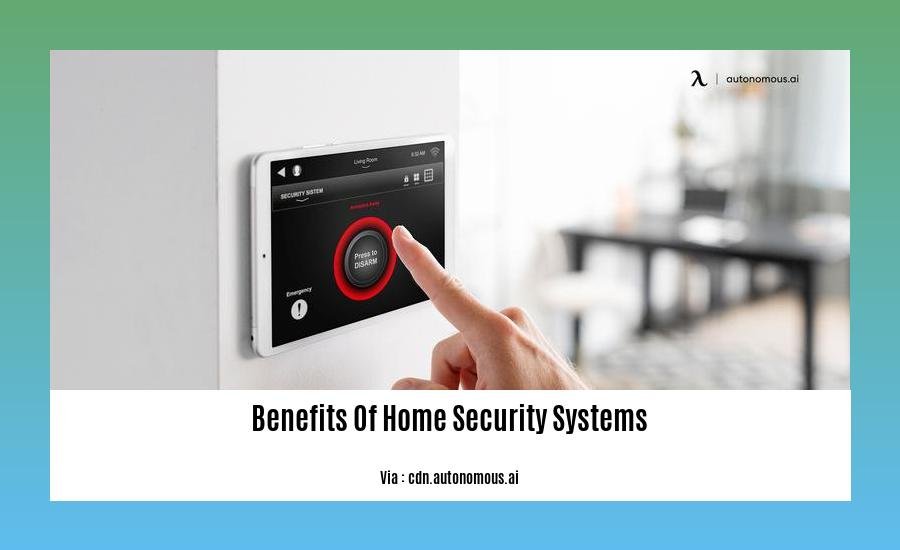In the contemporary world, ensuring the safety of our homes and loved ones is of paramount importance. Home security systems have evolved as a cornerstone of modern home protection, offering a plethora of benefits that enhance safety, provide peace of mind, and deter potential threats. In this article, we will delve into the numerous advantages of home security systems, exploring how they empower homeowners to safeguard their properties and create a secure environment for their families. [- Benefits of Home Security Systems: Enhancing Safety and Peace of Mind].
Key Takeaways:
-
Home security systems shield against theft, burglary, fire, and water damage.
-
Visible security markers deter burglars, decreasing break-ins.
-
Remote monitoring offers peace of mind and alerts during emergencies.
-
Smart devices controlled through the system improve convenience and conserve energy.
-
Installing a home security system often leads to reduced home insurance premiums.
Benefits of Home Security Systems:

Protection from Break-Ins and Burglary:
Home security systems act as a formidable barrier against unwanted intruders, providing peace of mind and safeguarding your family and possessions. Visible security signage and cameras serve as deterrents, discouraging potential burglars from targeting your property. Moreover, motion sensors, glass break detectors, and other advanced security features can promptly alert you to any suspicious activity, allowing for immediate action.
Fire, Smoke, and Carbon Monoxide Monitoring:
Home security systems extend their protection beyond theft and burglary, offering vigilant monitoring against fire, smoke, and carbon monoxide hazards. Smoke detectors, heat detectors, and carbon monoxide detectors work in tandem to detect these life-threatening emergencies swiftly, alerting you and the appropriate authorities before the situation escalates. This proactive monitoring can save lives and prevent extensive damage to your home.
Real-Time Remote Monitoring and Alerts:
With today’s interconnected world, home security systems empower you with the ability to keep a watchful eye on your home from anywhere, anytime. Using a smartphone app or web interface, you can remotely arm and disarm your system, receive real-time alerts of any triggered sensors, and even view live footage from security cameras. This remote access grants you unparalleled peace of mind, knowing you can safeguard your home even while you’re away.
Integrated Smart Home Automation:
Modern home security systems transcend the traditional boundaries of security, seamlessly integrating with various smart home devices to enhance convenience, energy efficiency, and overall living comfort. Control lights, thermostats, locks, and other devices from a single, intuitive interface, enabling you to create customized home automation scenes that suit your lifestyle and preferences. These smart features not only elevate your comfort but also contribute to energy savings and a more sustainable home environment.
Reduced Home Insurance Premiums:
Investing in a home security system can yield monetary benefits as well. Many insurance companies acknowledge the enhanced security provided by these systems and offer reduced home insurance premiums to homeowners who install them. This financial incentive further underscores the value of home security systems, making them a worthwhile investment in safeguarding your home and saving money in the long run.
-
Explore the benefits of the internet for students, such as accessing vast knowledge resources, enhancing research capabilities, and improving communication and collaboration skills.
-
Discover the myriad benefits of performing homam at home, including the purification of the home, creation of a positive atmosphere, and the bestowal of divine blessings.
-
Uncover the advantages of keeping a Nataraja statue at home, such as its ability to enhance spiritual energy, promote harmony and balance, and bring good fortune and prosperity.
Features and benefits of different home security systems
Imagine a secure haven where you can rest easy, knowing your loved ones and possessions are safe. Home security systems are not just an extra expense; they’re an investment in peace of mind. Let’s delve into the myriad benefits and features these systems offer.
Key Security Features:
-
Motion Sensors: These vigilant guardians detect movement, sounding the alarm if an intruder dares to step foot on your property.
-
Door and Window Sensors: Acting as silent sentinels, these sensors keep watch over entry points, triggering an alert if a door or window is opened unexpectedly.
-
Glass Break Sensors: Ever heard the ominous sound of shattering glass in the dead of night? These sensors pick up on that distinct frequency, sending an immediate alert.
-
Video Cameras: Consider them the eyes of your home, streaming live footage to your devices, allowing you to keep a watchful eye from anywhere.
Benefits of a Secure Home:
-
Deterrence: A visible security system is like a “Keep Out” sign for burglars, discouraging them from targeting your home.
-
Peace of Mind: When you’re out and about, your home security system stands guard, giving you peace of mind knowing your loved ones and possessions are safe.
-
Remote Monitoring: Modern systems let you keep an eye on your home from anywhere via a smartphone app. You’re always connected, always in control.
-
Home Automation Integration: Your security system can become the central hub for your smart home devices, controlling lights, thermostats, and locks with a simple tap.
-
Emergency Response: Some systems go above and beyond, connecting you directly to emergency services with the press of a button.
With all these benefits, it’s clear that home security systems are a worthwhile investment. They provide a sense of security, convenience, and peace of mind that’s priceless. Protect your home, protect your family, and choose a home security system that fits your needs.
Key Takeaways
-
Home security systems offer features like motion sensors, door and window sensors, glass break sensors, and video cameras to deter crime, provide peace of mind, and allow for remote monitoring.
-
Benefits of home security systems include deterrence, peace of mind, remote monitoring, home automation integration, and emergency response.
-
Investing in a home security system not only enhances safety but also provides a sense of convenience and peace of mind.
[Citations:]
[1] SafeHome.org: A Complete Guide to Home Security Systems in 2024
[2] Helios Security Systems: Home Security Systems: Benefits, Types & Risks
Cost and installation of home security systems

Do you desire a secured haven for your loved ones and valuable possessions, devoid of anxiety about potential breaches? A home security system may be the ultimate solution you seek. But before embarking on this journey, understanding the financial implications is vital.
Key Takeaways:
- Equipment Costs:
- Varies based on brands and features
- Motion sensors: $15-$40
- Smart locks: $150-$300
- Smart lights: $15-$90 each
-
Smart smoke alarms: $40-$110 each
-
Installation Fees:
- National providers often offer free installation
-
Local providers may charge fees ranging from $100-$800
-
Activation Fees:
- One-time fee charged by some providers
-
Typically ranges from $50-$230
-
Monthly Monitoring Fees:
- Recurring charges for professional monitoring services
- Basic plans start at $15-$25/month
-
Advanced plans with additional features can cost $50 or more/month
-
Contracting:
- Long-term contracts (2-3 years) common with national providers
-
Early termination fees may apply
-
DIY vs. Professional Installation:
- DIY systems offer cost savings
-
Professional installation ensures proper functioning and warranty coverage
-
Research and Comparison:
- Compare quotes from multiple providers
-
Consider long-term costs, including monitoring fees and potential upgrades
-
Government Subsidies and Rebates:
-
Check for local and federal incentives to offset costs
-
Insurance Discounts:
- Homeowners insurance may offer discounts for homes with security systems
Remember, while home security systems can be an investment, the peace of mind and enhanced protection they provide are invaluable. Evaluate your needs, compare options, and choose a system that fits your budget and security requirements.
Sources:
Potential Drawbacks of Home Security Systems
Every home security system brings something unique to the table, however it’s crucial to acknowledge that no system is foolproof and there might be some potential drawbacks one should consider before making a final decision. Here are a few aspects to ponder:
Costly Installations
Home security systems, especially the ones that offer comprehensive protection, can come with hefty installation fees. These charges may vary depending on the complexity of the system, the type of equipment used, and the monitoring service you choose. Be prepared for upfront expenses, and carefully weigh the long-term benefits against the initial investment.
Ongoing Monitoring Fees
Most home security systems require ongoing monitoring services, which typically involve a monthly fee. The costs can vary widely, so it’s essential to compare different providers and plans to find one that fits your budget. Keep in mind that these fees can add up over time, and they may include additional charges for extra features or equipment.
False Alarms
Home security systems are designed to alert you to potential threats, but they can sometimes trigger false alarms. These can be caused by various factors such as sensor malfunctions, environmental disturbances, or human error. While false alarms can be disruptive and inconvenient, they can also lead to fines in some areas. It’s essential to carefully calibrate and maintain your system to minimize the chances of false alarms.
Power Outages and Internet Connectivity
Home security systems heavily rely on reliable power supply and internet connectivity to function effectively. However, power outages or internet disruptions can temporarily disable your system, leaving your home vulnerable. Consider investing in a backup power source or choosing a system that offers cellular connectivity as a backup option to ensure continuous protection.
Privacy Concerns
Home security systems often involve cameras and other devices that collect data and footage. While these technologies are intended to enhance security, they also raise privacy concerns. It’s important to research the system’s privacy policies and understand how your data is collected, stored, and used.
Maintenance and Upkeep
Home security systems require regular maintenance and upkeep to ensure they remain effective and reliable. This may include tasks such as replacing batteries, updating software, and performing routine inspections. Be prepared to allocate time and resources for ongoing maintenance to keep your system functioning at its best.
Key Takeaways:
-
Home security systems can be costly to install and maintain.
-
Ongoing monitoring fees can add up over time.
-
False alarms can be disruptive and may lead to fines.
-
Power outages and internet disruptions can disable the system.
-
Privacy concerns may arise due to data collection and usage.
-
Regular maintenance and upkeep are essential for optimal system performance.
Sources:
FAQ
Q1: How do home security systems prevent burglary?
A1: Home security systems act as effective deterrents against burglary by increasing the likelihood of apprehending intruders. The presence of security features like motion sensors, alarm systems, and surveillance cameras discourages potential burglars and reduces the chances of a break-in.
Q2: Can I remotely monitor my home using a security system?
A2: Yes, many modern home security systems offer remote monitoring capabilities. You can use a smartphone app or a web interface to access your system from anywhere, allowing you to check on your property, view live video feeds, receive alerts, and control smart devices.
Q3: Are there any cost savings associated with having a home security system?
A3: Implementing a home security system can lead to cost savings in several ways. Some insurance providers offer discounted premiums for homes equipped with security systems. Additionally, the reduced risk of burglary and property damage can save you money in the long run.
Q4: How do home security systems enhance peace of mind?
A4: Home security systems provide peace of mind by giving homeowners a sense of control and security. Knowing that your home is protected against potential threats allows you to relax and enjoy your daily life without constant worry or anxiety about the safety of your property and loved ones.
Q5: Do home security systems require professional installation?
A5: The installation requirements for home security systems vary depending on the type of system and its components. Some systems are designed for easy self-installation, while others may require professional assistance. If you’re not comfortable installing the system yourself, it’s recommended to hire a qualified technician to ensure proper setup and functionality.
- Dora the Explorer Wipe-Off Fun: Safe & Mess-Free Activities for Little Explorers - April 18, 2025
- Does Lemongrass Repel Mosquitoes? Fact vs. Fiction + How to Use It - April 18, 2025
- Do Woodchucks Climb Trees?Fact vs. Fiction - April 18, 2025










